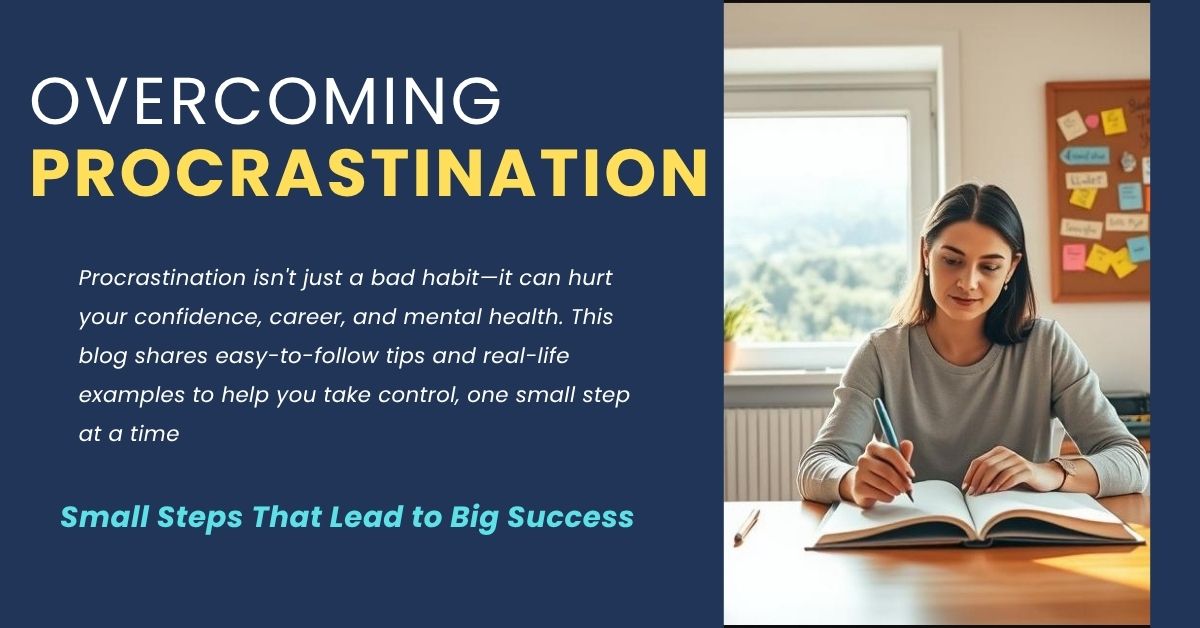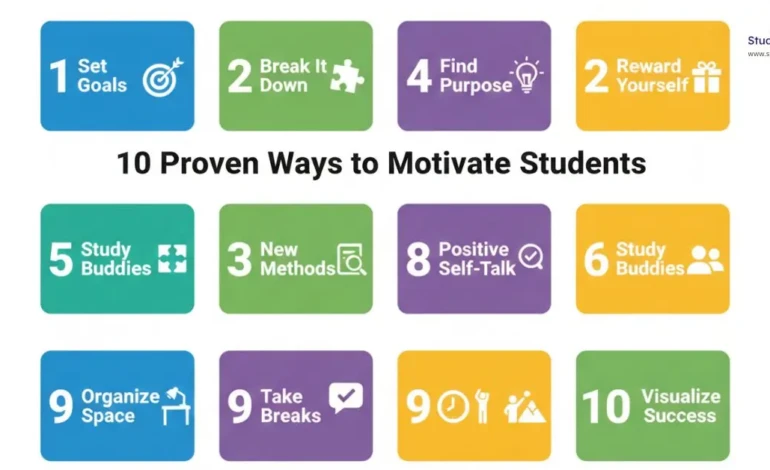Overcoming Procrastination: Small Steps That Lead to Big Success

Let’s Understand “Procrastination”
We all put things off. It happens to the best of us, whether it’s postponing personal objectives, chores, or work. But you know what? In order to fix it, you don’t need to take drastic measures. Little things you do every day might have a big impact. Let’s discuss the causes of procrastination and how to overcome it in a healthy way.

Why Do We Procrastinate?
Procrastination means putting things off even when we know it might lead to stress or missed opportunities. It’s not just laziness—it’s often a mix of emotions and hidden fears. You might procrastinate because of:
- Fear of failure
- Perfectionism
- Feeling overwhelmed
- Lack of motivation
First step? Understand your “why”. Once you identify the cause, you can start using specific techniques to tackle it.
How Procrastination Impacts Your Life
Let’s be real—procrastination doesn’t just delay work. It affects your mood, confidence, and relationships. Here’s how:
- Stress & Anxiety: Last-minute work = high pressure = burnout.
- Missed Opportunities: Delays can cost you chances in work, school, or life.
- Low Self-Esteem: Repeated delays make you feel “lazy” or “incapable”.
- Poor Quality Work: Rushed tasks usually don’t reflect your real potential.
Overcoming procrastination helps you feel more in control, more confident, and more satisfied in life.
What Triggers Procrastination?
You can’t fight what you don’t see. Some common procrastination triggers include:
- Big tasks that feel overwhelming
- Too many distractions (hello, social media!)
- Unclear goals that don’t feel achievable
Start by spotting your own triggers. Once you know them, you can beat them.
Easy and Practical Ways to Beat Procrastination
Let’s now focus on the good part—solutions. You don’t need a major lifestyle makeover. Just start small.
1. Break Big Tasks into Smaller Chunks
Big jobs can feel scary. Break them down!
Example:
Meet Akshay, a college student preparing for finals. He felt overwhelmed by her syllabus. So, she studied one chapter per day and used flashcards for key points. After a week, she felt more confident—and yes, she aced her exams!
2. Set Clear and Simple Goals
Don’t just say: “I’ll work on this project.”
Say: “I’ll complete the introduction by 3 PM.”
👉 Clear goals = clear focus.
3. Try the Two-Minute Rule
If something takes less than 2 minutes, do it immediately.
Example:
Raghav, a software developer, used to delay small emails. Then he tried the two-minute rule. Within weeks, his inbox was cleaner, and his mind was lighter.
4. Prioritize Your Tasks
Not everything is urgent. Use a method like the Eisenhower Matrix to:
Lets understand what is “Eisenhower Matrix” It is a simple decision-making tool that helps you prioritize tasks based on their urgency and importance. It divides your tasks into four categories:
- Important & Urgent: Do these tasks immediately.
- Important but Not Urgent: Schedule these tasks for later.
- Not Important but Urgent: Delegate these if possible.
- Not Important & Not Urgent: Eliminate or ignore these tasks.
But How do we Create a Productive Environment
Your surroundings affect your mindset more than you think.
- Declutter: A clean desk = a clear mind.
- When your workspace is tidy and organized, it’s easier to focus and think clearly. Remove unnecessary items, papers, or distractions from your desk. Keep only what you need in front of you—this helps reduce mental clutter and boosts productivity.
- Reduce Interruptions: Silence notifications. Let others know you’re in “focus mode.”
- Turn off notifications on your phone and computer while working. Let your family, friends, or coworkers know that you need uninterrupted time—this is your “focus mode.” Fewer interruptions mean better concentration and faster progress on tasks.
- Use Tools: Apps like Trello, Todoist, or Google Calendar can keep you on track.
Story of Ameha:
Ameha, a graphic designer, used to work in a messy space with constant phone beeps. She cleaned her desk, added a motivational quote, and set her phone to Do Not Disturb. Her productivity boomed!
Build New Habits That Beat Procrastination
Small habits → Big results
- Start Small & Stay Consistent: Begin with 10 minutes a day.
- Reward Yourself: Finished a task? Celebrate it, even if it’s a coffee break.
- Track Progress: Use a journal or app to see how far you’ve come.
How to Manage Time to Overcome Procrastination
Time is your best friend—if you manage it well.
- Time Blocking: Reserve specific hours for specific tasks.
- Pomodoro Technique: Work for 25 minutes, then take a short break.
- Set Deadlines: Even if they’re self-made, they add urgency and structure.
Let Go of Perfectionism
Perfectionism kills progress. Let’s understand this
1. Accept Imperfection
Waiting for things to be perfect often leads to never starting at all. Remind yourself: “Done is better than perfect.” It’s okay if your work isn’t perfect—what matters most is that you’re into the moving stage.
2. Focus on Progress, Not Perfection
Shift your mindset from trying to be perfect to simply improving. Celebrate small wins and growth, even if there are mistakes along the way. Progress is what leads to long-term success, let it be just keep mobing.
3. Set Realistic Standards
Don’t set impossible goals that only cause frustration. Instead, aim for “good enough” and keep improving with time. This reduces pressure and helps you stay consistent and motivated.
Example:
Raj, an aspiring writer, delayed writing his book for months. Finally, he aimed for 500 imperfect words per day. He completed the first draft in 30 days. It wasn’t perfect, but it was done—and that was a win!

Stay Accountable with a Buddy
Telling someone your goals can work like magic.
Example:
Lavisha, a fitness enthusiast, often skipped workouts. Her friend Lila became her accountability partner, regularly tracking. They started checking in daily. Maya began to show up—even on lazy days—because someone was counting on her.
Be Kind to Yourself
Procrastination is something many people struggle with—you’re not alone, and beating yourself up won’t help. Instead of criticizing yourself for delays or mistakes, practice self-compassion.
- Acknowledge your efforts even when the outcome isn’t perfect.
- Treat yourself like you would treat a friend going through the same situation.
- Learn from setbacks instead of letting them define you.
Remember, change takes time. Being kind to yourself helps build resilience and keeps you motivated to move forward. When you’re gentle with your inner voice, you’re more likely to grow and stay consistent.
In Summary: Small Steps Make a Big Difference
Procrastination doesn’t disappear overnight. But each tiny, intentional step matters.
- Break tasks down
- Set clear goals
- Manage your time
- Focus on progress
- Create a supportive environment
The best time to start? Right now.
One step today can change your tomorrow.
Final Thought: Have You Started Yet?
So, tell me—have you taken the first step?
Are you still thinking, or do you feel that little push to get up and get going?
Stand up, take a deep breath, and start doing one of your planned tasks right now.
It doesn’t have to be perfect—just start!
And once you do, come back and share your progress.
Drop a comment below and let me know how you started, what worked for you, or how you’re feeling now.
















4 Comments
[…] Overcoming Procrastination: Small Steps That Lead to Big Success […]
[…] Let’s Understand “Procrastination” – […]
[…] https://studyreach.in/overcoming-procrastination-small-steps-lead-big-success/ […]